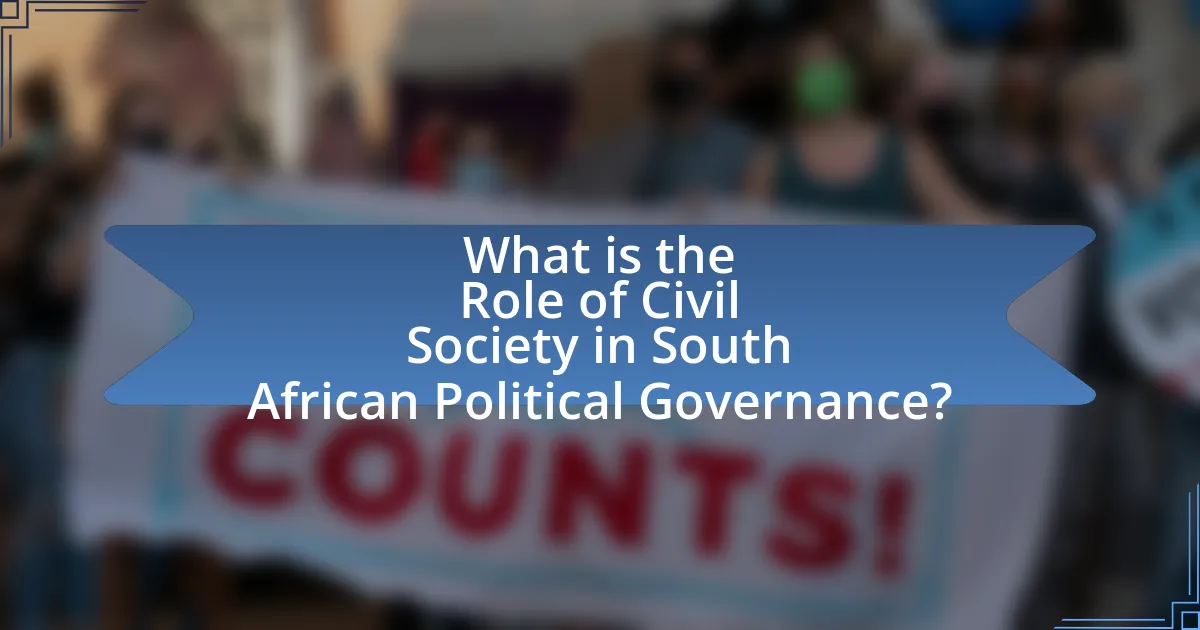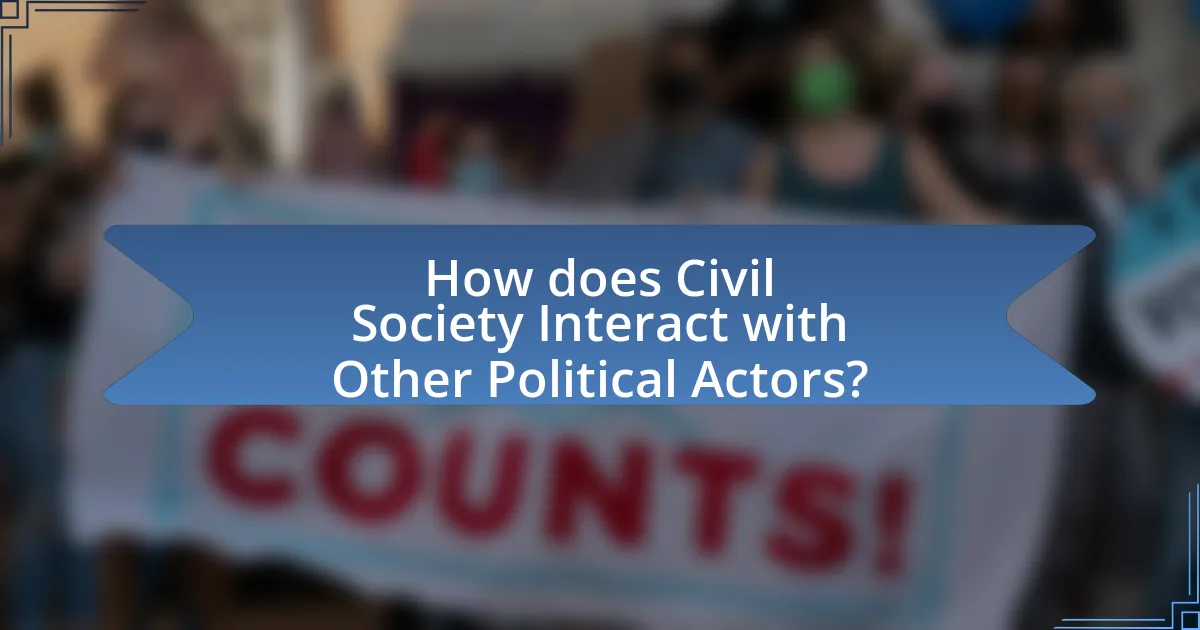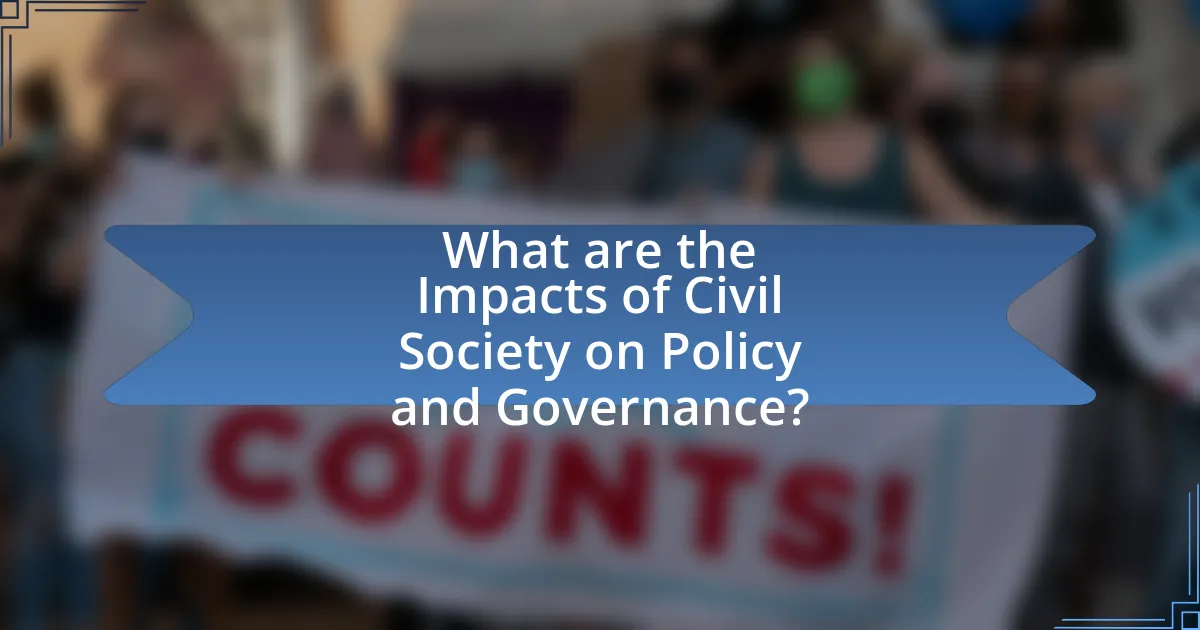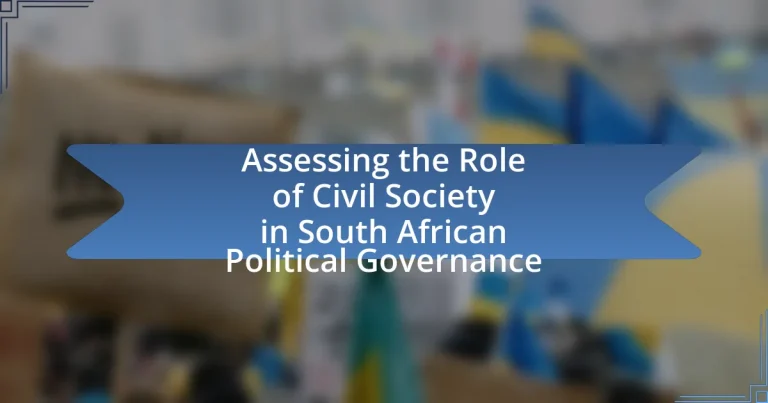The article assesses the role of civil society in South African political governance, highlighting its significance in promoting democratic values, advocating for human rights, and ensuring government accountability. It discusses how organizations such as the Treatment Action Campaign and the South African Council of Churches influence political decision-making through advocacy and public participation. Key challenges faced by civil society, including government repression and funding constraints, are examined, along with the interactions between civil society, political parties, and the private sector. The article also outlines the mechanisms civil society employs to shape public policy and the successes achieved in governance, emphasizing the importance of civic engagement and collaboration for effective democratic processes.

What is the Role of Civil Society in South African Political Governance?
Civil society plays a crucial role in South African political governance by promoting democratic values, advocating for human rights, and holding the government accountable. Organizations within civil society, such as non-governmental organizations (NGOs) and community groups, engage in activities that enhance public participation in governance processes, thereby fostering transparency and accountability. For instance, the South African Council of Churches and the Treatment Action Campaign have been instrumental in mobilizing citizens around issues like health care and social justice, influencing policy decisions and legislative reforms. Additionally, civil society acts as a watchdog, monitoring government actions and ensuring that citizens’ voices are heard, which is vital for a functioning democracy.
How does civil society influence political decision-making in South Africa?
Civil society influences political decision-making in South Africa through advocacy, mobilization, and participation in governance processes. Organizations such as the Treatment Action Campaign and the South African Council of Churches have effectively lobbied for policy changes, particularly in health and social justice issues. For instance, the Treatment Action Campaign played a crucial role in the government’s decision to provide antiretroviral treatment for HIV/AIDS, demonstrating how civil society can shape health policy through persistent advocacy and public mobilization. Additionally, civil society groups often engage in public consultations and contribute to policy formulation, ensuring that diverse voices are heard in the political arena. This engagement is supported by the South African Constitution, which guarantees the right to participate in political processes, further legitimizing the role of civil society in influencing decision-making.
What are the key organizations that constitute civil society in South Africa?
Key organizations that constitute civil society in South Africa include the South African Council of Churches, the Treatment Action Campaign, and the Black Sash. The South African Council of Churches plays a significant role in advocating for social justice and human rights, while the Treatment Action Campaign focuses on health rights, particularly in relation to HIV/AIDS. The Black Sash is known for its work in promoting social justice and protecting the rights of marginalized communities. These organizations contribute to the democratic process and hold the government accountable, reflecting the active engagement of civil society in South Africa’s political governance.
How do these organizations engage with government institutions?
Organizations engage with government institutions through advocacy, policy dialogue, and collaborative initiatives. They often participate in public consultations, provide expert opinions on legislation, and mobilize community support to influence government decisions. For instance, civil society organizations in South Africa have been instrumental in shaping policies related to human rights and social justice by presenting research findings and recommendations to government bodies. This engagement is supported by the South African Constitution, which encourages public participation in governance, thereby validating the role of these organizations in the political landscape.
Why is civil society important for democratic governance in South Africa?
Civil society is crucial for democratic governance in South Africa because it fosters accountability, promotes civic engagement, and protects human rights. Civil society organizations, such as NGOs and community groups, serve as watchdogs that monitor government actions, ensuring transparency and holding officials accountable for their decisions. For instance, the Treatment Action Campaign played a significant role in advocating for access to HIV/AIDS treatment, influencing government policy and demonstrating the power of civil society in shaping public health outcomes. Furthermore, civil society encourages citizen participation in the democratic process, empowering individuals to voice their concerns and influence policy-making. This engagement is vital in a diverse society like South Africa, where various interests must be represented to achieve inclusive governance.
What functions does civil society serve in promoting accountability?
Civil society serves several critical functions in promoting accountability, including advocacy, monitoring, and facilitating public participation. Advocacy efforts by civil society organizations raise awareness about governance issues and hold public officials accountable for their actions. Monitoring activities involve tracking government performance and policy implementation, which helps identify corruption and inefficiencies. Additionally, civil society facilitates public participation by engaging citizens in decision-making processes, ensuring that their voices are heard and considered in governance. These functions collectively enhance transparency and accountability within the political system, contributing to more effective governance in South Africa.
How does civil society contribute to public participation in governance?
Civil society contributes to public participation in governance by acting as a bridge between citizens and the government, facilitating dialogue and advocacy. Organizations within civil society mobilize communities, raise awareness about governance issues, and provide platforms for citizens to express their views, thereby enhancing democratic engagement. For instance, in South Africa, organizations like the Treatment Action Campaign have successfully influenced policy changes by organizing public campaigns and legal actions that reflect the voices of marginalized groups. This active involvement not only empowers citizens but also holds the government accountable, ensuring that public policies align with the needs and interests of the populace.
What challenges does civil society face in South Africa?
Civil society in South Africa faces significant challenges, including government repression, funding constraints, and social inequality. Government repression manifests through restrictive legislation and intimidation tactics aimed at civil society organizations, limiting their ability to operate freely. Funding constraints arise from a reliance on international donors, which can lead to instability and vulnerability in their operations. Additionally, social inequality exacerbates the challenges faced by civil society, as marginalized communities often lack access to resources and representation, hindering effective advocacy and participation in governance. These factors collectively undermine the capacity of civil society to influence political processes and promote democratic governance in South Africa.
How do political dynamics affect the operations of civil society organizations?
Political dynamics significantly influence the operations of civil society organizations by shaping their funding, regulatory environment, and public perception. For instance, in South Africa, the political landscape can either facilitate or hinder the activities of these organizations based on government policies and political stability. When the government is supportive, civil society organizations may receive funding and resources, enabling them to operate effectively. Conversely, in a repressive political climate, these organizations may face restrictions, such as stringent regulations or reduced funding, which can limit their ability to advocate for social change. Historical examples include the increased scrutiny and limitations placed on NGOs during periods of political unrest, which directly impacted their operational capabilities and outreach efforts.
What legal and regulatory barriers exist for civil society in South Africa?
Legal and regulatory barriers for civil society in South Africa include restrictive legislation, bureaucratic hurdles, and limitations on funding. The Nonprofit Organisations Act of 1997 imposes registration requirements that can be cumbersome, while the Public Finance Management Act restricts how civil society organizations can receive and manage funds. Additionally, the Protection of Constitutional Democracy Against Terrorist and Related Activities Act has raised concerns about potential overreach, as it could criminalize certain forms of advocacy and dissent. These barriers can hinder the operational capacity and effectiveness of civil society organizations in promoting democratic governance and accountability.

How does Civil Society Interact with Other Political Actors?
Civil society interacts with other political actors through advocacy, collaboration, and accountability mechanisms. Advocacy efforts by civil society organizations often influence policy decisions by mobilizing public opinion and providing expertise on social issues, as seen in South Africa’s anti-apartheid movement, where organizations like the Black Sash played a crucial role in shaping political discourse. Collaboration occurs when civil society groups partner with government entities and political parties to address common goals, such as improving service delivery or promoting human rights, exemplified by initiatives like the South African National Civic Organisation working alongside local governments. Additionally, civil society holds political actors accountable by monitoring their actions and demanding transparency, which is evident in the work of organizations like Corruption Watch, which investigates and exposes corruption within government. These interactions demonstrate the significant influence and role of civil society in shaping political governance in South Africa.
What role do political parties play in relation to civil society?
Political parties serve as a crucial link between civil society and the state, facilitating representation and advocacy for the interests of citizens. They mobilize public opinion, articulate policy preferences, and engage in dialogue with civil society organizations to address social issues. For instance, in South Africa, political parties like the African National Congress and the Democratic Alliance have historically interacted with civil society groups to shape policies on human rights and social justice, reflecting the demands and concerns of the populace. This interaction is essential for fostering democratic governance and ensuring that the voices of diverse communities are heard in the political arena.
How do political parties collaborate with civil society organizations?
Political parties collaborate with civil society organizations by engaging in dialogue, forming coalitions, and participating in joint initiatives that address social issues. This collaboration often involves political parties seeking input from civil society to inform policy decisions, while civil society organizations leverage their grassroots connections to mobilize support for political agendas. For instance, in South Africa, political parties have worked with organizations like the Treatment Action Campaign to advocate for health policies, demonstrating how such partnerships can influence legislative outcomes and enhance democratic governance.
What tensions exist between civil society and political parties?
Tensions between civil society and political parties in South Africa primarily stem from differing priorities and approaches to governance. Civil society organizations often advocate for social justice, human rights, and accountability, while political parties may prioritize electoral success and party loyalty. This divergence can lead to conflicts, particularly when civil society critiques government policies or actions that political parties support. For instance, during the #FeesMustFall movement, civil society groups challenged the government’s stance on higher education funding, highlighting the disconnect between public demands and political responses. Such tensions are further exacerbated by perceptions of co-optation, where political parties may attempt to absorb civil society initiatives for their own gain, undermining the independent advocacy role of these organizations.
How does civil society engage with the private sector?
Civil society engages with the private sector through partnerships, advocacy, and accountability mechanisms. These interactions often involve non-governmental organizations (NGOs) collaborating with businesses to address social issues, such as poverty alleviation and environmental sustainability. For instance, in South Africa, civil society organizations have worked with private companies to implement corporate social responsibility (CSR) initiatives that benefit local communities. This collaboration is supported by frameworks like the South African Companies Act, which encourages businesses to consider their social impact. Additionally, civil society holds the private sector accountable by monitoring corporate practices and advocating for transparency, thereby influencing policy and promoting ethical business conduct.
What partnerships are formed between civil society and businesses?
Partnerships formed between civil society and businesses include collaborations focused on social responsibility, community development, and advocacy for sustainable practices. These partnerships often involve businesses providing funding or resources to civil society organizations, which in turn implement programs addressing social issues such as education, health, and environmental sustainability. For instance, in South Africa, companies like Coca-Cola have partnered with local NGOs to improve water access and sanitation in underserved communities, demonstrating a commitment to corporate social responsibility while addressing critical societal needs. Such collaborations not only enhance the impact of civil society initiatives but also improve the public image and community relations of businesses involved.
How does corporate social responsibility intersect with civil society initiatives?
Corporate social responsibility (CSR) intersects with civil society initiatives by fostering collaboration between businesses and non-profit organizations to address social issues. This partnership enhances community development, as companies often support civil society projects through funding, resources, and expertise, which can lead to improved social outcomes. For instance, in South Africa, many corporations engage with civil society to tackle challenges such as poverty and education, demonstrating a commitment to sustainable development. Research indicates that CSR initiatives can amplify the impact of civil society efforts, as seen in programs that align corporate goals with community needs, thereby creating a synergistic effect that benefits both sectors.

What are the Impacts of Civil Society on Policy and Governance?
Civil society significantly influences policy and governance by advocating for public interests, promoting accountability, and enhancing democratic participation. In South Africa, civil society organizations have played a crucial role in shaping policies related to human rights, social justice, and environmental sustainability. For instance, the Treatment Action Campaign successfully lobbied for access to antiretroviral treatment for HIV/AIDS, demonstrating how civil society can drive policy changes that directly impact public health. Furthermore, civil society acts as a watchdog, holding government officials accountable and ensuring transparency, which is vital for effective governance. Research by the Human Sciences Research Council indicates that civil society engagement has led to increased citizen participation in governance processes, thereby strengthening democracy in South Africa.
How does civil society shape public policy in South Africa?
Civil society shapes public policy in South Africa by advocating for citizen interests, influencing legislative processes, and holding the government accountable. Organizations such as the Treatment Action Campaign have successfully lobbied for policies that improve public health, demonstrating the power of civil society in effecting change. Additionally, civil society groups engage in public consultations and mobilize communities to participate in policy discussions, ensuring that diverse voices are heard in the policymaking process. This active participation is crucial, as it fosters transparency and responsiveness in governance, ultimately leading to more equitable policies that reflect the needs of the population.
What mechanisms do civil society organizations use to influence policy?
Civil society organizations influence policy through advocacy, lobbying, public campaigns, and research. Advocacy involves raising awareness and mobilizing public opinion to support specific issues, while lobbying directly engages policymakers to persuade them to adopt certain positions or legislation. Public campaigns utilize media and grassroots mobilization to highlight issues and pressure decision-makers. Research provides evidence-based insights that inform policy discussions and strengthen the arguments presented by civil society organizations. For instance, the South African NGO, SECTION27, has effectively used legal advocacy and public campaigns to influence health policy, demonstrating the impact of these mechanisms in shaping governance.
How effective are these mechanisms in achieving policy change?
The mechanisms employed by civil society in South Africa are highly effective in achieving policy change. Evidence shows that civil society organizations have successfully influenced legislation, such as the Promotion of Access to Information Act, which was significantly shaped by advocacy efforts. Additionally, research indicates that public mobilization and strategic partnerships with political actors enhance the capacity of civil society to impact policy decisions. For instance, the 2012 #FeesMustFall movement exemplified how organized civil action can lead to substantial policy shifts in higher education funding. These examples demonstrate that civil society mechanisms are crucial in driving policy change in South Africa.
What successes has civil society achieved in South African governance?
Civil society in South Africa has achieved significant successes in governance, notably in promoting democratic accountability and human rights. For instance, organizations like the Treatment Action Campaign successfully advocated for access to antiretroviral treatment for HIV/AIDS, influencing government policy and improving public health outcomes. Additionally, civil society groups have played a crucial role in monitoring elections, ensuring transparency, and combating corruption, as evidenced by the work of the Electoral Institute for Sustainable Democracy in Africa, which has helped enhance electoral integrity since the end of apartheid. These efforts have contributed to a more engaged citizenry and strengthened democratic institutions in South Africa.
Which specific policies have been influenced by civil society advocacy?
Civil society advocacy has significantly influenced several specific policies in South Africa, including the Promotion of Access to Information Act (PAIA) of 2000, which was shaped by civil society’s push for transparency and accountability in government. Additionally, the National Development Plan (NDP) was informed by civil society input, emphasizing inclusive growth and social equity. The advocacy efforts surrounding the Prevention and Combating of Trafficking in Persons Act of 2013 also highlight the role of civil society in shaping policies aimed at protecting vulnerable populations. These examples demonstrate how civil society has effectively engaged in policy formulation and reform in South Africa.
What lessons can be learned from successful civil society interventions?
Successful civil society interventions demonstrate the importance of community engagement and collaboration in driving social change. These interventions often highlight that grassroots mobilization can effectively influence policy decisions, as seen in South Africa’s anti-apartheid movement, where organizations like the Black Sash played a crucial role in advocating for human rights. Additionally, successful interventions reveal that building coalitions among diverse stakeholders enhances the impact of advocacy efforts, as evidenced by the collaboration between various NGOs during the fight for the right to access healthcare in South Africa. Furthermore, effective communication strategies are essential for raising awareness and garnering public support, which was evident in campaigns that utilized social media to mobilize citizens around key issues.
What best practices can civil society adopt to enhance its role in governance?
Civil society can enhance its role in governance by fostering transparency, engaging in advocacy, and promoting civic education. Transparency initiatives, such as public reporting and open data platforms, enable citizens to hold government accountable, as evidenced by the success of organizations like Corruption Watch in South Africa, which has increased public awareness of corruption. Engaging in advocacy allows civil society to influence policy decisions, demonstrated by the role of the Treatment Action Campaign in advancing healthcare rights. Additionally, promoting civic education empowers citizens to participate actively in governance processes, as seen in programs by organizations like the Electoral Institute for Sustainable Democracy in Africa, which have improved voter turnout and informed citizen engagement in elections.


